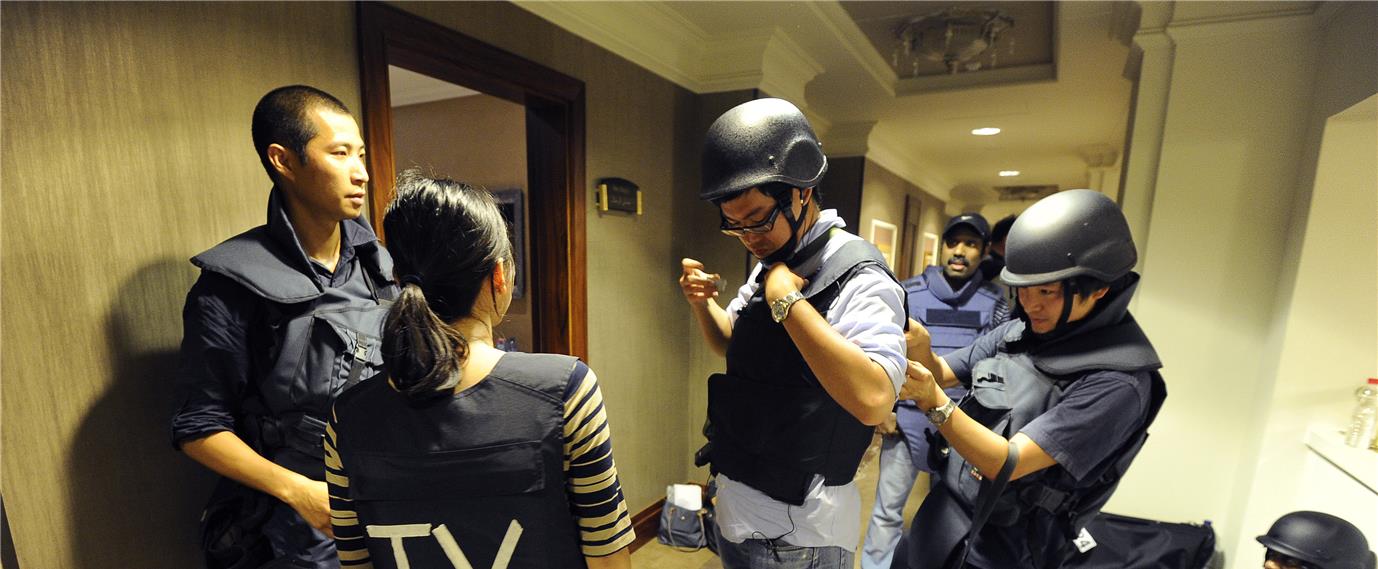بعد امتلاك بعض النصائح والمهارات الأساسية لإعداد خطة محكَمَة لتغطية صحفية، وحديثنا عن "الأمن الشخصي في مناطق النزاع"، سنتابع اليوم بعض التفاصيل الخاصة بالأمن الشخصي بالنسبة لمقر الإقامة خارج أرض المهمة والاعتماد على الذات في الميدان". لابد من التذكير أيضاً بأن قراءة هذه المقالات لا تُغنِ بأي شكلٍ من الأشكال عن الخضوع لدورات مباشرة في السلامة المهنية، بإمكانِك الاتصال بأقرب نقابة صحفية لك أو التواصل مع المؤسسات ذات الصِلة بما فيها مؤسسة الجزيرة.
مقر الإقامة:
إن اختيار مقر الإقامة غالباً ما يكون من مهام المؤسسة الإعلامية، لكن إن وقَع هذا العبء عليك، فأمامك بعض الإجراءات التي يجب اتباعها، في حال كان وصولك عبر المطار أو من خلال أي منفذ آخر، كن على حذر من استخدام سيارات الأجرة أو وسائل النقل الخاصة، اتجه فوراً إلى المواصلات العامة، بالطبع أنت تحتفظ بخرائط واضحة في مخيِّلتك حول المكان الذي ستذهب إليه حتى وإن كانت هذه زيارتك الأولى للمدينة، فخلال عملية التخطيط والبحث هناك مرحلة مهمة في دراسة جغرافية المكان، اتجه إلى مركز المدينة وابحث عن فندق مؤمَّن بكاميرات مراقبة، وإن لم يتوفَّر ذلك كن حريصاً أن يكون المكان خاضعا للمراقبة عبر شركة حمايات خاصة على مدار اليوم، غالباً ما تكون هذه الأماكن مجهزة للسياح فوجودك فيها يعطي انطباعاً بأنك سائح أمام أعين المتطفِّلين، كن على حذر من استخدام الخرائط الورقية في الشارع بشكل علني، هذا يشير أنك غريب عن المكان ويمنح الآخرين فرصة عرض خدماتهم عليك، إذا شعرت في أي لحظة أن هناك من يتبعك اتجه فوراً إلى أماكن مزدحمة وادخل بين الناس ثم اتجه إلى أحد المحلات العامة وهناك اطلب المساعدة للوصول إلى المكان الذي تود الذهاب إليه.
عند اختيار فندق للإقامة، ابتعد عن الأماكن التي تقع على أطراف المدن أو في الأرياف، ضع في حساباتِك أن مركز المدينة يضم أيضاً مراكز حيوية قد تكون عُرضةً لبعض المواجهات في حال شهدت المنطقة اضطرابات متنوعة، لابد من القول هنا إنه لا يوجد مقر آمن مائة بالمائة لكن هناك إجراءات معيَّنة تساعد على التقليل من المصاعب والمخاطر التي قد تواجهُك، قبل استئجار غرفة في الفندق مثلاً حاول أن تدور حول المكان وتنظر للمبنى بعين اللص لاكتشاف أماكن الضعف فيه أو الثغرات التي يمكن الولوج منها، هل هناك بناء مجاور للفندق يمكن الوصول منه إلى سطح الفندق، هذا سيشكِّل خطراً إضافياً، حاول أن تسأل عند الحجز عن مخارج الطوارئ الموجودة أو يمكنك أن تجدها في منشورات خاصة أو إشارات منتشرة في بهو الفندق، اسأل عن إمكانية وجودك بين الطابق الثالث والسادس إذا كان المبنى مؤلَّفاً من تسعة طوابق مثلاً، واحرص أن تكون في المنتصف فهذا يقلل من إمكانية تعرضك لحادث إذا وقع اقتحام للفندق من الباب الرئيسي ويعطيك فرصة كافية للهرب من مخارج الطوارئ إذا كان الخطر قادماً من السطح.
تأمين الغرفة:
من المهم جداً أن تطلب من فريق الخدمة في الفندق عدم الدخول إلى الغرفة إلا بحضورك، واعمل على إخفاء أي ذواكر رقمية تضم مواد عملك بعيداً عن أيدي وأعين الآخرين، أيضاً احفظ المال الذي تحمله في مكان ملاصق لك، يُنصَح هنا باستخدام محفظة يتم لصقها بالجسد أو في علبة السجائر، إن مقدار حرصك يضمن لكَ عدم الوقوع في المتاعب، يمكنك أيضاً أن تضع نقاط علَّامة عند باب الغرفة أو في الخزانة والحقيبة لتعرف في حال العبث بها أو الدخول إلى الغرفة في غيابك، وفي حال وجودك في الغرفة فإن إغلاقها من الداخل بسلسلة الأمان أمر هام لضمان عدم قدرة أي معتد على اقتحامها بسهولة، تذكَّر دائماً أن غرفتَك هذه ليست ملجأ آمنا أبداً في حال حدوث أي طارئ، فهروبكَ منها بأسرع ما يمكنك هو الضامن الوحيد لبقائك على قيد الحياة، لهذا ضع حقيبة الهرب - التي تضم بعض الأشياء الرئيسية التي سنأتي على ذكرها في بحث لاحق- في متناولك دائماً، يُفضَّل أن تكون على بُعد ذراع منك دائماً.
في عملية تأمين الغرفة التي تقيم بها، لا تجعل نومَكَ بالقرب من النافذة الزجاجية فهذا سيتسبب بإصابتِكَ إذا وقع أي خطر خارجي، وتأكَّد من وجود عين سحرية صالحة وأقفال إضافية في الداخل، قم بجولة في مرفقات الغرفة واكتشف إذا ما كان يمكن الهبوط من سقف الحمَّام المُستَعار إلى الغرفة، يُفضَل أيضاً النظر إلى وجود حماية داخلية للنوافذ مثل القضبان الحديدية أو الشبك المعدني وأنه لا يمكن فتحها من الخارج مطلقاً.
العلاقة مع المحيط:
إن إخبارَك لمساعديك المحليين عن مكان إقامتك أو كمية الأموال التي تحملها يشكل خطورة عليك، لذلك لا تخبر أحداً مطلقاً باستثناء نقطة الاتصال مع مؤسستك الإعلامية عن مكان تواجدك، وينصح في هذا الاطار إجراء اللقاءات أو الاجتماعات مع فريق المساعدين في محطة المواصلات العامة أو في مقهى أو في سيارة مؤمَّنة تستخدمها بشكل عادي خلال المهمة، الحديث مع المساعدين المحليين يجب أن يكون في الخطوط العامة.
احرص على حمل كمية كافية من المال معك، قبل سفرك قم بتصريف ما يكفيك من المال إلى العملة المحلية للبلد الذي تنوي إنجاز المهمة فيه، إلى جانب مبلغ آخر بالعملة العالمية التي يتم قبولها في أي مكان "يورو أو دولار أميركي"، وبالنسبة لأوراقِك الشخصية "جواز السفر، البطاقات البنكية، بطاقات التعريف الخاصة بك" فأمامك أن تضعها في مكان آمن "أمانات الفندق مثلاً" وتتنقَّل بصور طبق الأصل عنها تخمل نفس صفاتها من حيث اللون والتغليف.
عليكَ في عملية التواصل مع المحيط الخارجي أن تعرف الكلمات المفتاحية التي يستخدمها السكان المحليون – حتى وإن بديتَ كسائح- مثلاً كيف ينطق سكان المنطقة التحيات في الأوقات المختلفة "صباح الخير، مساء الخير، كم ثمن هذا، أريد أن أُجري اتصالا" إلى جانب أسماء الأطعمة الشعبية المتوفرة وكيفية نطقها، ابتعد عن ارتياد الأماكن مرتفعة الأسعار، كما واحرص على عدم ارتداء أي ملابس تحمل أي رموز دينية أو علامات سياسية أو إعلانية، العلم الأميركي على القميص مثلاً أو الكوفية الفلسطينية أو قبعة تحمل العلامة الخاصة بالمؤسسة الإعلامية التي تعمل بها، كما وتجنب الدخول في حوارات جانبية مع أي أحد حتى لو كانت عن الطقس وتقلُّباتِه، لا تدخل في أي نقاش سياسي أو رياضي أو اقتصادي بالمطلق، ولا ترد على التحرُّشات اللفظية التي تتعرض لها، حدَث هذا معي مرَّتين في مِصر، خلال خكم الرئيس محمد مرسي حيث واجَه فريق التغطية أشخاصاً قاموا بتوجيه عبارات مسيئة لجماعة الإخوان المسلمين، أيضاً في بداية الانقلاب العسكري حيث كنت في رحلة لإنجاز فيلم وثائقي خرَجَ أشخاص يهتفون أمامنا "مرسي رئيسي"، لا ترد على كل ما يشابه هذه التحرشات اللفظية واعمل على إنجاز ما تريد وغادر المكان بسرعة.
تذكَّر دوماً أنك في مهمة عليك إنجازها في أسرع وقت والعودة إلى المقر صِفر








































